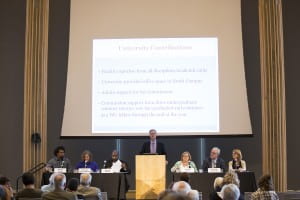In a brightly lit forum of the Brown School’s new Hillman Hall, a collection of Washington University leaders addressed the recent calls to action made by the Ferguson Commission.
In the wake of the unrest in Ferguson, Missouri Gov. Jay Nixon formed the Commission to take an honest assessment of the underlying issues the community faced. After a year of study and deliberation, the Commission released four major initiatives: justice for all, youth at the center, opportunity to thrive and racial equity.
The panel, held on October 23rd, concentrated on the initiatives around youth and health and how the Wash U community could answer the calls to action. Among the panelists was executive director of the Institute for School Partnership (ISP) Victoria May.
“North County St. Louis is unique in that its median age is 18 years old, compared to the national average of 36 years,” May said. “Accessing this group’s potential through education could have a catalytic impact on its community. However, in order to develop great students, you need great teachers.”
According to the Ferguson Commission’s report, “roughly one in seven teachers in high-poverty public high schools are in their first or second year of teaching, as compared to fewer than 1 in 10 teachers in low-poverty public high schools.”
The ISP seeks to counterbalance this statistic by continuing to offer professional development opportunities to local educators that are based on research-proven best practices. Since 2002, the ISP has provided Ferguson Florissant educators with over 480 professional development events.
In addition to the ISP, the other panelists included Amanda Moore McBride, executive director of the Gephardt Institute for Civic and Community Engagement, Dedric Carter, associate provost and associate vice chancellor for innovation and entrepreneurship, and William Powderly, director of the Institute for Public Health.
Through the expertise of these organizations and through the engagement of the university community, Wash U can contribute to the efforts outlined by the Ferguson Commission, together making a way for youth development and the opportunity to thrive for all.
November 2015 | by, Gennafer Barajas

